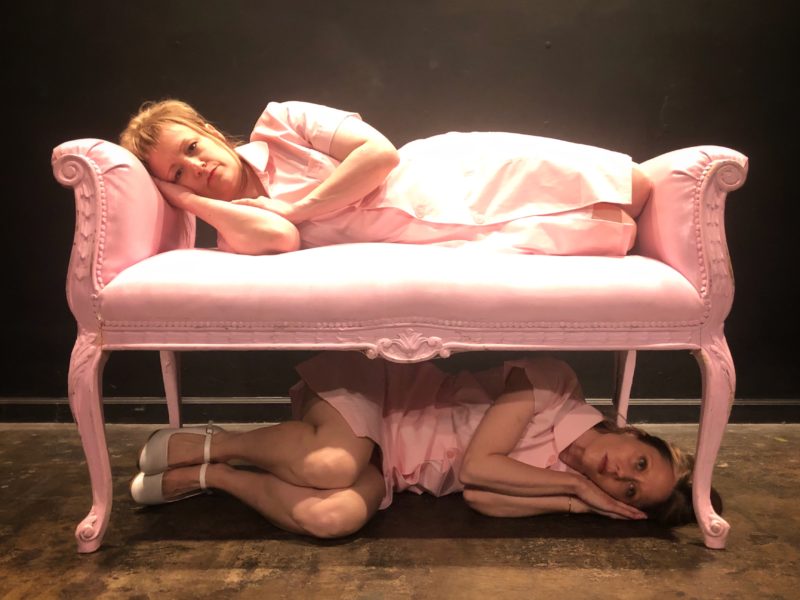Hollywood Fringe 2019

The Institute for the Opposite of Longing
Lindsay Beamish & Vanessa Peters

Genre: American Theater, Devised
Venue: Actors Company - The Little Theater
Festival: Hollywood Fringe
Low Down
In this surreal devised piece, two women seek to cure the pain of longing in others that they can’t quite seem to shake themselves. Visually arresting, intimately staged and creatively rendered, The Institute for the Opposite of Longing is a polished gem of theatre that will stick with you long after you leave the theater.
Review
Hollywood Fringe has shown an exciting trend of inventive work driven by female creators. While positions of power in the entertainment industry are still grossly male dominated, the Fringe offers a window into what kind of interesting, nuanced and empathic stories we could expect if we saw more women in creative control. The Institute for the Opposite of Longing, created by Lindsay Beamish and Vanessa Peters, is a unique work that centers on what happens to a maternal instinct deferred.
Seeing the aesthetic and learning the premise of Institute, I couldn’t help but think back on another wonderful Fringe piece at the Actor’s Company back in 2017, A Void. Kristen Kearse’s striking play also crossed two women and their desire to escape existential angst with an absurdist imagining of commercial/technological remedy. Beamish and Peters’ piece similarly focuses in on a very specific piece of the human experience: longing. Within the intimate confines of The Little Theater, the two create a surreal, pink, Michel Gondry-esque world of serene speech and clinical intake. Here, feelings of longing, loss, or desire can be quantified on a scale from 1-10, and whatever you are missing will be replicated and offered by a specialist, trained to “give.” The show blends heightened moments of performance with quiet realism: Beamish and Peters alternate between playing both clients of the Institute and its lead technicians/founders, Julie and Meredith. The show quickly transcends “longing” as a general emotional state and focuses in on the thinly veiled pain of these women, who seek to escape the personal loss of a child they fostered by using their own therapy.
Institute does a masterful job of capturing that hollow feeling of longing in iconoclastic fashion—one of the diagnostic intake questions is whether or not one relates to a certain Japanese haiku. There is also a healthy dose of comedic irony that arises from this attempt to use the scientific method to solve an amorphous, emotional human issue—how could you ever pick a number from 1-10 to describe the pain of missing a child you helped raise? How can you pinpoint where in your body you feel the loss of your husband’s romantic interest? The Institute offers a certain percentage of relief—higher for those whose dads stuck around when the going got rough—through a therapeutic session where a giver offers you what you aren’t getting in real life. By showing both different client’s sessions and the founders’ own attempts to find relief, the play captures how impossible it is to truly fill the gaps of longing, no matter how we try to address it.
The show has a strong core, but as sometimes happens with devised pieces, it seems to lack a bit of structure that would give it more of a feeling of full development. I personally would have loved a bit more of a balance between other forms of yearning with the very specific pain of maternal longing—we go deep into this sentiment with the founders’ prolonged reenactment of losing their foster son, but also touch upon it with the client Karen Jacobs, albeit in a creepier fashion, where Peters winds up playing her baby. It was such an interesting investigation of this part of humanity, I wanted to see more clients, more specific stories of longing, more sessions that go off the rails in different ways. Perhaps in future incarnations, some of the founders’ scenes could be condensed/intercut with other clients the lend more variety to the piece. Regardless of this personal preference, the show was beautiful, powerful and deeply moving: the exploration of these women’s loss of a boy they loved deeply, and knowing that he is off there somewhere, growing up without them as his moms anymore was simply heartbreaking.
The Institute for the Opposite of Longing is another example of the unique and formidable work that is possible when independent theatre practitioners are able to take risks and realize their vision on their own terms.


















































